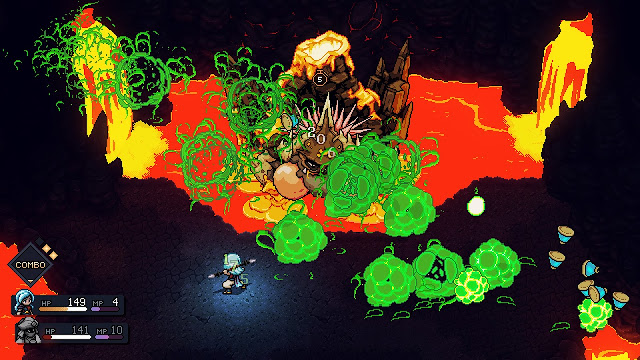'TIS A PRETTY SHALLOW POND
Hear ye, hear ye! We’ve all been misusing the word retro.
I recently learned—via a podcast—that calling decades-old games like Chrono Trigger or Final Fantasy VI “retro” is technically incorrect. The proper term would be vintage. A vintage gamer usually goes the extra mile to recreate the original experience as closely as possible: original hardware, period-accurate displays, the whole ritual.
Games like Sabotage Studio’s Sea of Stars, on the other hand, are truly retro: modern releases explicitly designed to emulate older classics. As a Japanese role-playing game, Sea of Stars wears its Chrono Trigger (1995) inspiration on its sleeve. The slightly skewed top-down perspective, the story structure, the combat systems, the fantasy–sci-fi crossover, the colorful pixel art, the melodic soundtrack, the innocent tone paired with existential stakes—it all evokes the golden age of 16-bit JRPGs.
Normally, I prefer retro games to vintage ones. Titles like Shovel Knight often take the aesthetics and ideas of older games and refine them with modern design sensibilities. Sea of Stars does this too—but perhaps too faithfully. It emulates its inspirations so closely that it occasionally becomes indistinguishable from the vintage experience it mirrors. And whenever I play a vintage game for the first time, it feels like homework: something I should experience for historical reasons rather than something I actively crave.
That leads me to the lingering question: why do I keep rewarding myself with long breaks after each play session? Why do I procrastinate instead of eagerly returning to the couch? In short—why do I repeatedly lose interest in Sea of Stars?
The answer isn’t simple. On the surface, the game is impeccable. The visuals are gorgeous, the soundtrack catchy, and the story carries itself to a satisfying conclusion.
The narrative centers on the Solstice Warriors, gifted youths training at Zenith Academy under the guidance of the headmaster Moraine. In this waterbound world of scattered islands, their task is to oppose the creations of the Fleshmancer—an evil alchemist whose monsters include the terrifying Dwellers, creatures capable of becoming world-ending threats unless stopped. Only the Solstice Warriors, wielding celestial powers, can harm them.
The game progresses linearly, but smart pacing and a handful of effective plot twists maintain interest. You play as either Zale or Valere—children of the sun and moon—switchable at will. In practice, the choice is cosmetic. Their personalities are interchangeable, and since you control both in combat, the decision boils down to a gender toggle.
I played as Zale throughout, but found Valere—the blue-haired monk with her staff—to be far more useful in combat. Her “Moonerang” ability became a staple: a magical crescent moon bouncing between enemies and her staff at increasing speed, continuing until you miss a perfectly timed parry. In theory, it can go on indefinitely; in practice, it’s a delightful risk–reward mechanic.
These timing-based inputs are the game’s most engaging combat feature. Well-timed button presses boost damage or mitigate incoming attacks—a mechanic borrowed from Super Mario RPG (1996) that livens up turn-based combat considerably. Add special attacks, party-dependent combos, and flashy finishers—limit break–style abilities triggered by a charged meter—and combat initially feels rich and expressive.
As new party members join, each brings elemental skills that enable you to break enemy “locks”—charged attacks that can be weakened or canceled with the correct damage types. In theory, this adds strategic depth. In practice, randomness often undermines it. Certain lock types appear before you even have access to the required elemental skills, making some encounters feel unfair rather than tactical.
This is where combat began to wear thin. Despite the abundance of options, I gravitated toward the same few optimal strategies. Many abilities felt too situational, too weak, or too costly in mana. Over time, combat became reactive rather than expressive: break locks, heal, repeat. I rarely felt encouraged to go on the offensive. The illusion of choice extended to leveling as well—stat boosts rarely made a meaningful difference in the long run.
Outside of combat, Sea of Stars excels at first impressions. The pixel art is immaculate, the world populated by charming creatures—moles, robots, fish folk, giants—all rendered in expressive manga style. But beyond surface appeal, little truly hooked me. The game leans heavily on nostalgia for a genre era I don’t personally feel nostalgic about. Playing it often felt like studying for an exam I’d never signed up for.
To its credit, the game respects the player’s time. There’s no grinding, no random encounters, and enemies don’t respawn unless you leave and return. Puzzles are light and breezy, side content is optional—you can beat the main game without touching it—and the overall pacing is smooth. The difficulty is forgiving—I never saw the game-over screen—and that’s not a criticism. It makes Sea of Stars an excellent entry-level JRPG, even offering so-called relics to further customize difficulty.
For veterans, however, the appeal may hinge on console-era nostalgia. As an Amiga player, I largely missed the 16-bit JRPG boom. My formative RPG experiences were dungeon crawlers and Western CRPGs like Eye of the Beholder and Champions of Krynn. That context matters.
Sea of Stars radiates competence. Every system works. Every pixel is polished. Yet as a whole, it feels less than the sum of its parts. The world offers limited deviation, the story unfolds along rigid rails, and the combat never evolves meaningfully past its opening hours. I defeated the final boss using essentially the same special attack that carried me through the first.
I wouldn’t discourage anyone drawn in by the visuals from trying it. It’s a beautifully crafted, beginner-friendly JRPG that may spark a love for the genre—or rekindle fond memories for SNES veterans. But for me, the nostalgia on offer didn’t quite align. This game’s square-shaped inspiration peg simply doesn’t fit my round nostalgia hole.
Interpret that however you wish.








Comments
Post a Comment